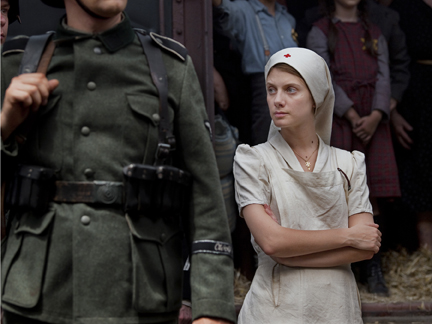
Mélanie Laurent in LA RAFLE (THE ROUND-UP) (Menemsha Films)
Advisory to American audiences: La Rafle is not about a raffle, except in the ironic sense. The title of this searing history lesson refers to the round-up of 13,000 French Jews, old and young, in the summer of 1942 by French police, through the streets of Paris, into a sports stadium, before trains transported them to Auschwitz. It took more than 50 years for the country’s government to acknowledge its complicity.
Only a handful of French Jews targeted that summer survived to return, and writer/director Rose Bosch found them to glean vivid details in clearly meticulous research. She focuses first on one Jewish Parisian family from Montmartre in June 1942, the Weismanns, as they are adjusting to life with increasing restrictions from jobs, public parks, and schools. Like about a third of the Jews then in France, the religious mother Sura (played by Raphäelle Agogué with a Yiddish accent) had fled from anti-Semitism in Eastern Europe, while the Communist father, Schumel (Gad Elmaleh), is a French citizen already in hiding since there had previously been round-ups of men.
The relationships and the increasingly horrific events are seen from the point of view of their children: 11-year-old Joseph (Hugo Leverdez), forced to be wise beyond his years, and his teen sister Rachel (Rebecca Marder), plus their little neighbor Nono (played by the deliciously cute twins Mathieu and Romain Di Concetto, who compete for the Most Adorable French Kids on Screen with the imp in War of the Buttons). While other dramatizations of the July 16 round-up have bitterly noted how Le Tout Paris watched, and some jeered, Bosch points to those who warned about the arrests of whole families, causing neighbors to quickly take in young children that desperate parents pushed at them. (Ten thousand Jews on the list were not found that day.)
The point of view shifts to a gentile young nurse, Annette Monod (Mélanie Laurent, whose grandfather was deported to Auschwitz), sent by the Red Cross to the bicycle racing stadium Velodrome d’Hiver, known as Vel’ d’Hiv. When she enters, the shocking conditions in the steamy heat will immediately remind Americans of the larger Louisiana Superdome that held fewer people during the Hurricane Katrina disaster for a similar length of time.
The cinematic convention of noble characters from a different race, religion, or whatever involved with victims seems, at first, to function only to help the audience understand what families like the Weissmans were experiencing. But here they are specific individuals, including a fire department captain defiantly providing water and smuggling out messages, and they were later honored with the “Righteous Among the Nations” by the Holocaust memorial at Yad Vashem in Israel. They were important witnesses to a genocide that had no photographs or other visual documentation. Bosch also plays a bit of a trick on the audience by not showing until the evacuation that the doctor (Jean Reno) in charge of the pitiful infirmary in the middle of the bicycle track is also Jewish.
Conditions for the Jews get even worse when the families are sent to the Beaune-la-Rolande deportation camp, about 50 miles from Paris. When dogs and the French police crush people into the railroad cars, only the adults are first sent, and the separation of families is heartbreaking, with the nurse the only caring adult left for days with the starving and ill children, until a train comes for them, too. Bosch continues the story of the nurse (in actuality a social worker) through to 1945 when she helped returning Jews to find their families.
As visceral, powerful, and ever more awful as many of the scenes are, Bosch less successfully intercuts the larger historical context in scenes that come across as stiff educational recreations. The meetings in Vichy between Chief of State Marshal Pétain and Prime Minister Pierre Laval with the Germans are a bit confusing for a non-French audience, and with a survey this year showing that 60 percent of young French adults didn’t know about the round-ups, the occupation politics may be confusing for them, too. (The collaborators seem more reluctant to assist the Germans than usually depicted.) Worse, the scenes with Hitler at his Berghof Alpine headquarters, shot to look like Eva Braun’s home movies, feature a mechanical Great Dictator Hitler, and are edited too obviously to contrast him and his mistress cavorting luxuriously with the awful conditions of those at the receiving end of his orders for France.
There have been several French features on this subject in the past few years, such as Gilles Paquet-Brenner’s Sarah’s Key (2010), which was more widely released in the U.S. while La Rafle was slowly taking the Jewish film festival route. But those films added unnecessary or heavy-handed melodrama to a shameful episode that La Rafle more realistically brings to the screen.

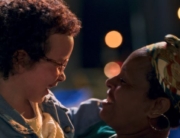
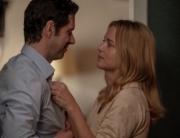
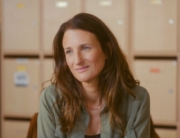
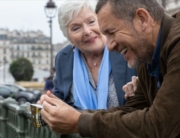
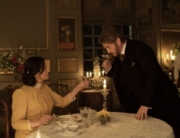
Nora–
Great review that instantly brings those awful days to mind.